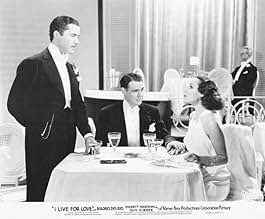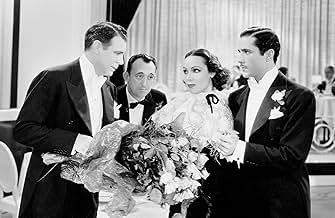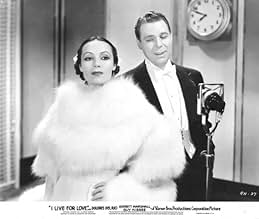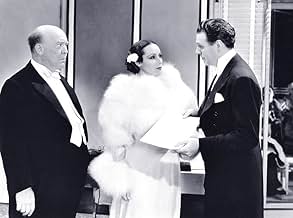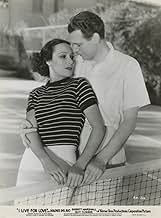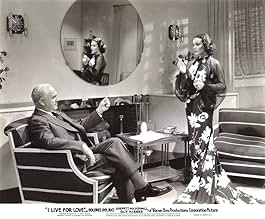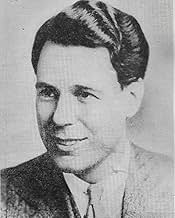AVALIAÇÃO DA IMDb
4,7/10
183
SUA AVALIAÇÃO
Adicionar um enredo no seu idiomaDonna (Del Rio) is a diva of the stage and wants her lover Rico (Alvarado) as her leading man. To keep this from happening, the producers (Churchill, Cavanaugh) grab Roger Kerry (Marshall) o... Ler tudoDonna (Del Rio) is a diva of the stage and wants her lover Rico (Alvarado) as her leading man. To keep this from happening, the producers (Churchill, Cavanaugh) grab Roger Kerry (Marshall) off the street and say he has a contract.Donna (Del Rio) is a diva of the stage and wants her lover Rico (Alvarado) as her leading man. To keep this from happening, the producers (Churchill, Cavanaugh) grab Roger Kerry (Marshall) off the street and say he has a contract.
- Direção
- Roteiristas
- Artistas
Dolores Del Río
- Donna Alvarez
- (as Dolores Del Rio)
Al Shaw
- Street Musician
- (as Shaw)
Sam Lee
- Street Musician
- (as Lee)
Robert Greig
- Fat Man Dancing at Nightclub
- (as Robert Grieg)
Miki Morita
- Toyo - Roger's Butler
- (as Mike Morita)
William A. Boardway
- Party Guest
- (não creditado)
Nick Copeland
- Stage Manager
- (não creditado)
Lester Dorr
- Assistant Ticket Seller
- (não creditado)
Frank Du Frane
- Actor at Audition
- (não creditado)
Bill Elliott
- Minor Role
- (não creditado)
- Direção
- Roteiristas
- Elenco e equipe completos
- Produção, bilheteria e muito mais no IMDbPro
Avaliações em destaque
The generic, meaningless tile is a tip-off. Everett Marshall has no screen presence. He may have been a popular radio singer but what he's given here is dull and repetitious.
The ravishing Dolores del Rio is made up too heavily and essentially miscast. Lupe Velez, who was at another studio, would have been much for fun. So would any number of Warner Brothers stars. Glenda Farrell, Winifred Shaw, Joan Blondell -- all of them could play temperamental divas in their sleep.
It's hard to think hat Busby Berkeley had anything to do with this movie, which has no real dancing and has no style. It would have been better, right from the start, had there been a couple other female characters. Del Rio has no one to bounce off. And Marshall certainly is no help.
The ravishing Dolores del Rio is made up too heavily and essentially miscast. Lupe Velez, who was at another studio, would have been much for fun. So would any number of Warner Brothers stars. Glenda Farrell, Winifred Shaw, Joan Blondell -- all of them could play temperamental divas in their sleep.
It's hard to think hat Busby Berkeley had anything to do with this movie, which has no real dancing and has no style. It would have been better, right from the start, had there been a couple other female characters. Del Rio has no one to bounce off. And Marshall certainly is no help.
Stage diva Donna Alvarez (Dolores del Rio) wants her fawning lover Rico Cesaro (Don Alvarado) to be her leading man. Her producer pretends to agree and tells her that another actor has a signed contract to be the lead. He picks Roger Kerry (Everett Marshall) randomly to be that man. Roger is a terrible actor and quits. He's a street singer and gains fame for turning down Donna. He is followed by three fellow street performers.
Busby Berkeley is the director but there are no big dance numbers. It's mostly singing especially from opera singer Everett Marshall who did some film work. I don't particularly like either Donna or Roger. She's snooty and he's a stiff on the screen. Snooty can work in a combative rom-com. Stiffness cannot be overcome. This is a love-hate relationship without the love. The switch comes out of nowhere. The movie wants them together more than I do. I don't live for this love.
Busby Berkeley is the director but there are no big dance numbers. It's mostly singing especially from opera singer Everett Marshall who did some film work. I don't particularly like either Donna or Roger. She's snooty and he's a stiff on the screen. Snooty can work in a combative rom-com. Stiffness cannot be overcome. This is a love-hate relationship without the love. The switch comes out of nowhere. The movie wants them together more than I do. I don't live for this love.
Everett Marshall only appeared in two films, this one and "Dixiana". While he was the leading man in each, he chose a different career path. He was a great operatic singer and simply chose to stay on the big stage where he made a fortune and gained fame. In hindsight, I think that was an excellent choice--especially since this sort of singing would only last in films until the early 1940s with the Jeanette MacDonald and Nelson Eddy films.
Marshall plays Roger Kerry--a singer who is about to become a radio sensation. However, his introduction to the American public isn't perfect as the show also featured Donna (Delores Del Rio), a very tempestuous stage star herself. They immediately take a dislike for each other but both are very successful over the air. Then their respective agents come up with a plan...play up their hatred to manipulate them and get the public to love them. They also then spread the story that the two have just fallen in love...though they hate each other. But, in a case of art imitating life, they do fall in love. But what will they each do? She has Broadway calling to her and he places like the Met. What's to become of them and their careers?
The story works reasonably well because the supporting actors are quite nice. But the story bogs down for me when the stars break into song...mostly because the singing, while great for the 1930s, is very old fashioned and dull when heard today to most folks. Still, a clever story makes it enjoyable in spite of the high-brow singing.
Marshall plays Roger Kerry--a singer who is about to become a radio sensation. However, his introduction to the American public isn't perfect as the show also featured Donna (Delores Del Rio), a very tempestuous stage star herself. They immediately take a dislike for each other but both are very successful over the air. Then their respective agents come up with a plan...play up their hatred to manipulate them and get the public to love them. They also then spread the story that the two have just fallen in love...though they hate each other. But, in a case of art imitating life, they do fall in love. But what will they each do? She has Broadway calling to her and he places like the Met. What's to become of them and their careers?
The story works reasonably well because the supporting actors are quite nice. But the story bogs down for me when the stars break into song...mostly because the singing, while great for the 1930s, is very old fashioned and dull when heard today to most folks. Still, a clever story makes it enjoyable in spite of the high-brow singing.
Way too much of opera singer Everett Marshall, not nearly enough of Dolores del Río. It's really a shame she didn't get better parts during her career, but at least she isn't forced to play into stereotypes in this role. The film suffers from a lack of humor, charm, and romantic chemistry though, and also from having been made after the Production Code went into place. Don't expect any flashy musical numbers, despite direction from Busby Berkeley either. Just a total blah.
The stars are foils for the fabulous supporting cast in this film --big name stars in the credits an hilarious reference to one of the movie's plot mechanisms, in which a big name star supposedly adds luster to a radio program. The supporting cast stars in this film, an acerbic send up of show business, both theater and newly popular radio. The film smacks by-then-dead vaudeville, then places both high toned "thea-tuh" and radio in the same category. With focus almost entirely on the supporting cast, who have all the great lines and embody the satire, the film moves at a good clip, challenging us not to give a hoot about the "stars'" love story. I found this film absolutely hysterical and laughed out loud through the whole thing.
Você sabia?
- CuriosidadesJane Froman is in studio records/casting call lists but did not appear in the movie. A modern source lists many actors in the cast, but the following were not seen: Betty Farrington, Bess Flowers', Mary Marsh, Gertrude Astor (all as Interviewers), 'Bill Elliott' (Friend) and Florence Fair (Dowager). It is probable that these were cut from the final release print, since it is listed as an 8-reel film, yet it is also listed for only a 64-minutes running time.
- Trilhas sonorasI Live for Love
(1935) (uncredited)
Music by Allie Wrubel
Lyrics by Mort Dixon
Sung by Everett Marshall at the radio show
Copyright 1935 by M. Witmark & Sons
Principais escolhas
Faça login para avaliar e ver a lista de recomendações personalizadas
Detalhes
- Data de lançamento
- País de origem
- Idiomas
- Também conhecido como
- I Live for Love
- Locações de filme
- Empresa de produção
- Consulte mais créditos da empresa na IMDbPro
- Tempo de duração
- 1 h 4 min(64 min)
- Cor
- Mixagem de som
- Proporção
- 1.37 : 1
Contribua para esta página
Sugerir uma alteração ou adicionar conteúdo ausente

